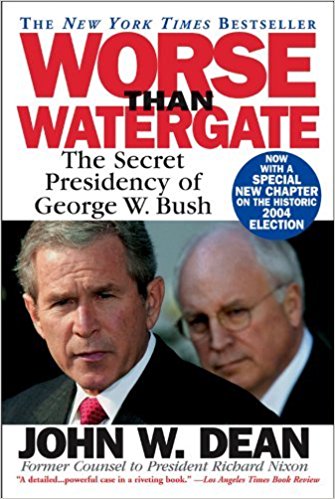'Worse Than Watergate' Is Worse Than Watergate
The rhetorical war over the Justice Department's Trump/Russia investigation is beating a dead metaphor.


"This is worse than Watergate," Americans for Limited Government President Rick Manning claimed in a FoxNews.com column yesterday. He was referring to the news that the Federal Bureau of Investigation had failed to retain five months' worth of text messages between FBI agents Peter Strzok (who was bounced from Robert Mueller's Special Counsel investigative team last summer for sending anti-Trump text messages) and his FBI girlfriend Lisa Page. "It is clear," Manning said, "that the American people need to know what was done by the Obama FBI and Justice Department to attempt to interfere with the 2016 election and the peaceful transfer of power."
If slipshod data retention of a high-ranking federal investigator's phone messages doesn't strike you as a weird comparison to a president of the United States likely ordering the destruction of key evidence in an investigation into his own crimes, that may be because you have long grown numb to the phrase "worse than Watergate." It was the title of a 2004 book (about George W. Bush) by former Richard Nixon attorney general White House counsel John Dean, and it has for decades been the designated damnation for everything from the Iran/Contra Affair to the Affordable Care Act.
As I wrote on this website more than a dozen years ago, "The potency of the very word [Watergate] helps explain…why we're always searching for someone worse than Nixon, and affixing the suffix 'gate' to every half-assed Washington scandal or minor-league journalistic triumph." Projection, and minimization, are often involved—by many accounts the most enthusiastic and influential "gate"-abuser was Richard Nixon's own official counter-puncher in Washington's early-'70s propaganda wars, William Safire.
Rick Manning is hardly alone in deploying the "worse than Watergate" phrase to describe Justice Department actions concerning President Trump: In recent days we've also heard from Rep. Steve King (R-Iowa), Rep. Scott DesJarlais (R-Tenn.), Rep. Paul Gosar (R-Ariz.), Sean Hannity ("far worse"), Boston Herald columnist Howie Carr ("way worse"), Herman Cain, and so on.
This being contemporary American politics, there's a large camp of people staring at the exact same investigation and using the exact same phrase to decorate the exact opposite conclusion. Venerated Atlantic journalist James Fallows last May authored a piece titled "Five Reasons the Comey Affair Is Worse Than Watergate." Disgraced (though not disgraced enough) former director of national intelligence James Clapper last June told reporters that "Watergate pales, really, in my view, compared to what we're confronting now." Others in the anti-Trump WTW camp include former George W. Bush ethics lawyer Richard Painter, veteran political journalist Elizabeth Drew, and (as ever) John Dean.
Could either side be right? If their darkest scenarios turn out to be true, sure. Say that Donald Trump had knowledge or suspicion that Vladimir Putin had kompromat about some of Trump's sex-related activities, and that the Trump empire was leveraged to the eyeballs with dodgy Russian finance, and that these factors contributed to Trump bringing on C-level Kremlin bootlickers like Paul Manafort and Mike Flynn, through which further ties were forged, including the sharing and dissemination of illegally obtained Hillary Clinton campaign emails, and perhaps some coordination involving Trump's state-targeting strategy and Russia-bot fake-news activities, and that everyone involved in these schemes (including Trump himself) serially lied about such collusion (including to federal investigators under oath), and then after all that engaged in a series of questionable actions design to thwart and even shut down investigation into all of it—then yes, such a compounding conspiracy and the attendant paranoia would look pretty damn Watergate-ish, with the possible worsening sprinkle of colluding with a hostile foreign adversary.
Similarly, if what Sen. Ron Johnson (R-Wisc.) says here is true, whoa:
But you'll rarely go broke in American politics betting against the maximum conspiracy scenario of entrenched partisans.

We are, as Jesse Walker pointed out last May, rerunning many of the same rhetorical themes we saw during the Watergate scandal. There's a reason why this is the year (and those were the wink-wink, nudge-nudges) of Steven Spielberg's The Post. During 1973–74, both sides of the clash greatly hyperbolized the underlying conflict, even while pointing in the direction of some truth. As Walker writes:
Then as now, each side accused the other of plotting a coup. Rumors that Nixon was planning to seize dictatorial powers circulated not just on the political fringes but in official Washington; many of the president's foes feared that fascism was on the way. After Nixon had Special Prosecutor Archibald Cox fired, Rep. Parren Mitchell of Maryland asked, "Will democracy as we have known it survive, or will fascism come to dominate in this country?" West Virginia Sen. Robert Byrd compared the move to a "Brownshirt operation."
Meanwhile, the president's defenders tried to write off the Watergate investigation as an attempt to invalidate the election. Some of them still do: Pat Buchanan, a Nixon staffer before he became a media star, marked the 25th anniversary of the break-in with a column calling Watergate "the overthrow of an elected president by a media and political elite he had routed in a 49-state landslide the like of which America had never seen." In more suspicious moments, Nixonites sometimes suggested that some deep-state force—[Baruch] Korff pointed his finger at "the unknown element of the CIA"—had orchestrated Nixon's troubles. (A few figures on the radical left agreed.)
Just as you don't have to think Nixon was a fascist to see the ways he undermined American liberties, you don't have to buy the whole Watergate-was-a-coup story to recognize that it contained at least a few grains of truth. To give the most obvious example, the most famous leaker of the Watergate era, the Washington Post source known as "Deep Throat," was eventually revealed to be Deputy FBI Director Mark Felt. He wasn't trying to overthrow the president, though—he was hoping Nixon would blame Felt's boss for the leaks and make Felt FBI director.
Another narrative-complicating factor is that, arguably, even Watergate wasn't nearly as bad as "Watergate." In the political lexicon, "Watergate" has come to signify every horrific abuse associated with the Nixon administration (and its immediate predecessors), such as the serial surveillance-state skullduggeries unearthed by the post-Watergate Church Committee. The Pentagon Papers, enjoying their latest revival, were largely about the hubris, military escalations, and cowardly face-saving of the Kennedy and Johnson administrations, yet they are more associated in the public imagination with the man who tried to suppress their publication. One irony of The Post is that—spoiler alert!—it ends portentously with the break-in at the Watergate hotel, but after two hours of speechifying about the bald-faced lies being used to justify a pointless and murderous war, this particular dirty trick feels like penny-ante stuff.
In terms of affecting and prematurely ending real human beings' lives, many things various presidents have done are, in fact, "worse than Watergate." The Iraq War and Drug War come quickly to mind; it's not hard to compile a long list. But policy disasters and impeachable offenses are just different categories, much as we wish otherwise. Is lying under oath the worst thing Bill Clinton did as president? Hardly. Though it was significantly more serious than, say, Travelgate.
As the Mueller investigation hurtles toward its final act, expect the current pitch of Watergate comparisons and conspiratorial speculations to escalate, and sharply. There will be increased talk, on both sides, of smoking guns, Saturday Night Massacres, and following the money. The intended effect may be to whip up outrage in one direction or the other, but a likely outcome for tens of millions of listeners and readers will be a numb sense of vague alienation.
"When one watches some tired hack on the platform mechanically repeating the familiar phrases," George Orwell memorably observed, "one often has a curious feeling that one is not watching a live human being but some kind of dummy: a feeling which suddenly becomes stronger at moments when the light catches the speaker's spectacles and turns them into blank discs which seem to have no eyes behind them."
Donald Trump has built a lifetime out of surpassing people's expectations, so if anyone could bury the metaphorical ghost of Richard Nixon and Watergate, it might be him. But I wouldn't bet on it.
